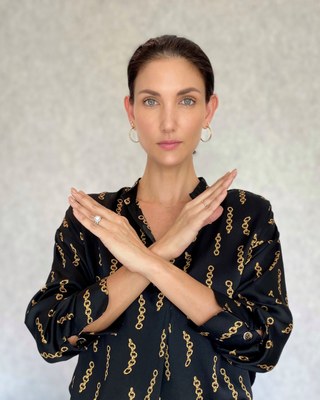Cindy Bishop: Embodying “Beautiful Without Ivory”
My involvement in conservation efforts stems from growing up as my father's daughter. He was a pioneer in scuba diving in Thailand and so for most of my childhood, I spent my time exploring the underwater world by his side, and that really gave me my first love of nature and conservation because I realized that there's a whole other world outside of us. It was a natural progression then to become the ambassador for Fin-Free Thailand, advocating against eating shark fin soup.
As a model and as an actress, I've always said no to wearing fur, or modeling any kind of jewelry that was made from ivory and exotic animal parts. It felt very wrong to me. So it was a no-brainer for me to be a part of USAID’s “Beautiful Without Ivory” campaign. In my own small way, I would help reduce the demand for wildlife products.
As someone who has been in the fashion industry now for almost 30 years, I do see a shift away from using wildlife products. Most brands now are in tune with sustainability issues. People now care more about where this product came from, or what kind of practices a particular brand or label supports. However, there are some perhaps more exclusive labels or brands that do still cater to demand for wildlife products because there is obviously a market for that. The challenge is then: How do we as an industry do more to promote sustainable products and really take a stance against using animals or products that are detrimental to environmental conservation? How do we expand the wildlife-free movement in the fashion and lifestyle
industry?
I think it definitely has to be a collaborative effort, both from the brands themselves and the consumers. The models and influencers taking a stance and saying, “No, I don’t support this,” puts pressure on the designers to find a different material to use. And, again, social media is such a powerful tool, and as you can see from USAID’s “Beautiful without Ivory” campaign, it really does have the power to change attitudes, opinions, and ultimately behaviors. As to being an “influencer” and championing a wildlife-free lifestyle, I can only speak for myself. “Influencer” is quite a new word that came with social media. I realize that it is now very much a part of my work. More than just being a public face, people look to you for inspiration. They are inspired by
who you are and what you represent. And so, for influencers and celebrities, you really need to be quite authentic with yourself and your followers about what you stand for. The choices that you actually make in your everyday life are so important, whether it be using reusable straws, not using plastic bags, or recycling. Do you walk the talk?
Personally, my family has made a pledge to never ride an elephant again, and at first it was a little bit tricky to explain that to our children. But this is what we have decided as a family and we talked about it with the children and said there are so many other ways to experience these magnificent creatures, without having to ride their backs or forcing them to do silly tricks like painting or football. You can walk with them in their natural environment, appreciate them for what they are: magnificent yet extremely vulnerable creatures. It’s really a matter of being a role model. Why would you want to sit above an elephant when you can have the experience of literally walking with them? We have to get away from this mindset that we have to dominate everything. We’ve done that, and the world is now overheating. It’s just not sustainable. Watch the “Beautiful without Ivory” video here.


